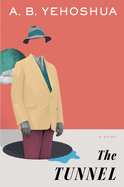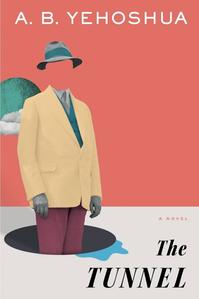
 The Tunnel, a novel by venerable Israeli author A.B. Yehoshua (Friendly Fire; The Retrospective), is a gentle fable about aging, marital love and understanding between two peoples in conflict.
The Tunnel, a novel by venerable Israeli author A.B. Yehoshua (Friendly Fire; The Retrospective), is a gentle fable about aging, marital love and understanding between two peoples in conflict.
The story of Zvi Luria begins with an ominous medical report, as he approaches age 73, five years retired from his position as senior engineer with the Israel Roads Authority. Zvi's neurologist informs him that an MRI has revealed the beginning of frontal lobe atrophy, indicating mild degeneration--perhaps explaining his inability to recall first names, or embarrassing episodes like the time he picks up the wrong child at his grandson's Tel Aviv kindergarten. Zvi's wife, Dina, a prominent pediatrician, encourages him to seek out a part-time job with his former employer, hoping that may slow his cognitive decline.
Zvi lands a position as an unpaid assistant to Asael Maimoni, a young engineer whose father, now dying of cancer, once served as Zvi's legal adviser. Zvi then becomes involved in an unusual project--the construction of a secret army road across the massive Ramon Crater in Israel's Negev Desert. As part of the design, Asael proposes, to a skeptical Zvi, a tunnel. It will allow a Palestinian family, exiled from their village, to continue to reside atop a hill that also features archeological ruins dating from the third century B.C.E., a symbol of the "human predicament arising from two nations living in the same homeland."
The machinations that lead to the design of a "modest, homey tunnel," and bring Zvi and Asael to the project's end, are less interesting than is Yehoshua's wry portrait of a proud, accomplished man who's been given a glimpse of his destiny, but who nonetheless is determined to live out his remaining days in dignity and with purpose. His depiction of the Lurias' marriage of nearly 50 years is affectionate but unsentimental, and laced with humor--like the scene where Zvi almost ends up onstage during a performance of the opera Romeo and Juliet--grounded in the bemused tenderness that's a feature of any long-lasting relationship.
In a country that's riven by conflict, Yehoshua's depiction of the interactions between the Israeli civil servants and the Palestinian family at least hints at the possibility of reconciliation, if not full-fledged peace. "Don't dismiss fantasies that bring hope," Asael reminds his elder colleague. Zvi, a man who prided himself during his long career on not learning anything about the personal lives of his co-workers, also undergoes a sort of emotional transformation that's both realistic and touching. In Yehoshua's capable hands, what could have been a depressing account of decline instead becomes one that chooses optimism over despair. --Harvey Freedenberg, freelance reviewer
Shelf Talker: A.B. Yehoshua delivers a tenderhearted story of an aging Israeli engineer involved in an improbable road-building project as he fights against his failing memory.

